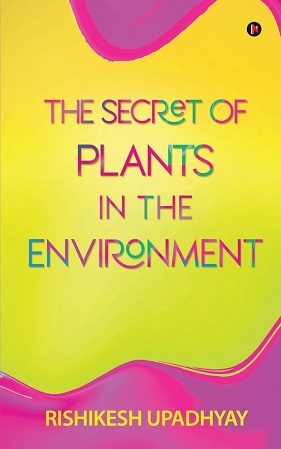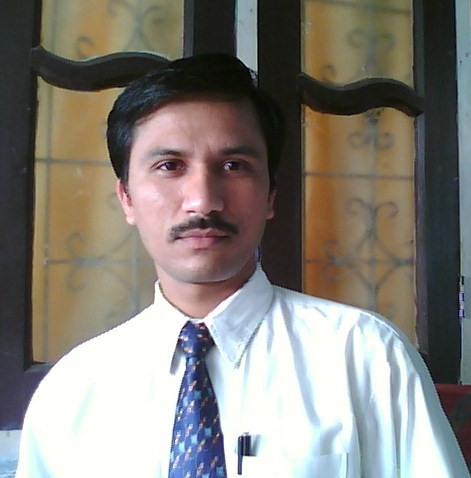I just love to write, learn and teach. From there, it just took shape. I always try to be genuine in my actions and my words.
Rishikesh Upadhyay – 4 August 2024
The Back Flap
Plants are sessile organisms that are unable to move but face the challenge of ever-changing or adverse environments. The study of the development of environmental changes in tolerant plants is fundamental for the maintenance and streamlining of high crop yields and plant adaptation in natural environments. The identification of genes that lead to changes or stress tolerance is urgently needed for the growth and development of plants in their natural environment.
The Secret of Plants in the Environment addresses environmental concerns such as the different types of stress situations and plant adaptation to changing environments, including the positive and negative effects of stress on the growth of crops, the beginning stages of plant life cycles, and plant output. This book seeks to discuss the impact of environmental changes or stress on plant life, environmental stress physiology, and adaptation mechanisms. It highlights the impact of environmental stresses on plants and crops under changing environments and gives a comprehensive overview of how plants respond to such environments.
In addition, it serves as a helpful guide to all professionals engaged in teaching and research on environmental-related subjects. It dwells on some important aspects of environmental change or stress as the main issue affecting the survival of plants at the early stages of their life cycle. Hence, the author hopes that both early-career scientists and research scholars interested in pursuing environmental science to an advanced stage would also benefit from the important information discussed in this book.
About the book
What is the book about?
There are so many messages i wanted to convey through The Secret of Plants in the Environment. Message of importance of growing plants, their life cycle, problems they faced through human activities, climate change, etc.
When did you start writing the book?
I wrote it first as a short article, and then began working on a book version in 2014.
How long did it take you to write it?
Seven years total
Where did you get the idea from?
Well, I was always inclining to writing and teaching from my post MSc onwards. It’s not possible to say where inspiration comes from? Well that is largely a mystery. Simply, I just love to write, learn and teach. From there, it just took shape. I always try to be genuine in my actions and my words.
We all know how important it is for writers to read. Are there any particular authors that have influenced how you write and, if so, how have they influenced you?
Wow, there are so many! I just want something that educates me, and better yet, teaches me something good. I pick those books by the author rather than the content sometimes. And the best stories have something to say. That’s important to me.
Do you have a target reader?
I have a varied audience — both men and women, young and old, even students or research scholars, teachers or professors. But the sweet spot would have to be people in their 15s – the 50s
About Writing
Do you have a writing process? If so can you please describe it?
Well, that is a pretty tough question to answer. To be honest, I do not follow any process, as you know it’s very hard to get yourself or anyone back in that zone of thinking about the imaginative world or idea that’s in your mind. During the day, I work at a local government college, and by night I pour my imagination and ideas out onto a page. I believe in and write.
Do you outline? If so, do you do so extensively or just chapter headings and a couple of sentences?
I do not. I just go for it!
Do you edit as you go or wait until you’ve finished?
I edit every page 9 or 11 times. I edit as I write. I stop and read whenever the thought or mood strikes me.
Did you hire a professional editor?
No
Do you listen to music while you write? If yes, what gets the fingers tapping?
No, writing requires utter silence.
About Publishing
Did you submit your work to Agents?
No, I did not submit
What made you decide to go Indie, whether self-publishing or with an indie publisher? Was it a particular event or a gradual process?
As this is my third book. I just want to taste self-publishing, so I go for it.
Did you get your book cover professionally done or did you do it yourself?
No, i do it myself.
Any advice that you would like to give to other newbies considering becoming Indie authors?
Would you please spend some time thinking about your reason for writing a book? Be prepared to invest a thousand hours, energy and perhaps many more, to finish a book you are proud to share with your friends, family or to the world. Make writing a hobby or passion, not for earning money. Revising and polishing your work before submitting it is also essential. Be friendly. Above all stand up for the truth.
About You
Where did you grow up?
I was born and grew up in the Bhanjang Basti, Haflong in the Indian states of Assam.
Where do you live now?
I still live in the Bhanjang Basti, Haflong. I’ve lived in other places earlier during my studies, but this is home.
What would you like readers to know about you?
In addition to writing nonfiction titles, I write articles, book chapters, children’s, research articles, poems, etc. Currently, I teach at a local government college.
What are you working on now?
I’m working on a couple of projects right now related to poetry, environment and children’s, but it’s tough to disclose anything right now.
End of Interview:
For more from Rishikesh Upadhyay visit Google Scholar and Goodreads , and follow him on LinkedIn and Twitter
Get your copy of The Secret of Plants in the Environment from Amazon US or Amazon UK.


